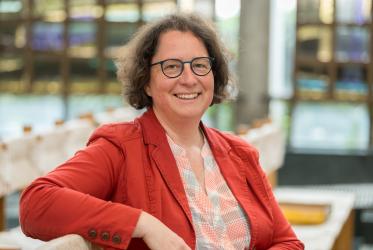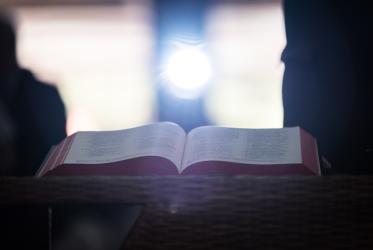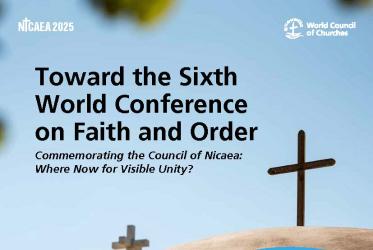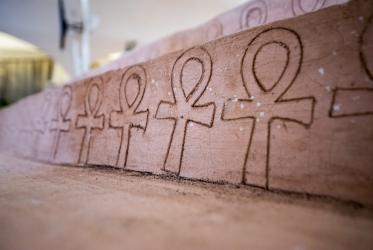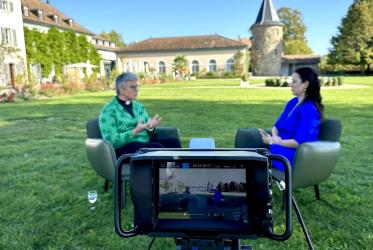It is a space that gathers theologians from across the world, coming from different church traditions, different personal and ecclesial experiences, various fields of expertise, all united and mandated by the churches to advance the goal of Christian unity. Although there are many other platforms for both official and unofficial dialogues, Faith and Order distinguishes itself through its unique character as the broadest, multilateral dialogue commission with a rich history, and profound ethos. It occupies a singular position in the ecumenical movement, serving as a testament to its irreplaceable role in fostering dialogue and mutual understanding. Over the next few days, we will not only delve into the essence of what this space represents, but also contribute to its ongoing evolution and enhancing its capacity to unite diverse Christian traditions in the quest for unity.
2. In the following words, as has been the Faith and Order tradition, I will offer a report on the work that has been done over the last year, provide information on the work of the Secretariat, and offer some reflections on the future of the Commission’s work.
ACTIVITIES
Commission Meetings
3. Starting from February 2023, the Nominations Committee appointed by the Commission worked on producing a list of Commissioners and consultants to be presented to the Central Committee for selection. After its initial in-person meeting, the Committee met a few more times online to revise and refine the list. Eventually, the list was approved, with more names added at the Central Committee meeting 2023 which took place at the Ecumenical Center in Geneva in June. The list includes 62 members, extending beyond the limit stipulated by the Faith and Order By-laws. However, it is well balanced, enabling representation of all regions, confessions, and church traditions, youth members, women, and men, lay and ordained, but also more importantly, it includes indigenous people and people living with disabilities. Notably, the Commission now includes an unprecedented number of Pentecostal members, from both WCC member churches and the Pentecostal World Fellowship, marking a significant step forward in our collaborative work. The Commission also has four consultants who contribute greatly to its work.
4. The previous Commission met online for its final meeting in April 2023. The Commission reviewed its work, approved the Concept Paper for the Nicaea2025 World Conference upon which further planning was based. The Commission also reviewed and discussed the survey conducted with the Commission members to evaluate achievements and received
the list of nominations presented by the Nominations Committee. The Commission proposed the Rev. Prof. Dr Stephanie Dietrich as the new Moderator of the Commission, which the Central Committee unanimously approved in June. Working with Stephanie over the last couple of months has been a true blessing for myself and colleagues who have worked with her in previous years.
5. The introductory online meeting of the current Commission, in September 2023, presented a unique opportunity for members to familiarize themselves with the Commission's vision and upcoming initiatives, particularly the Nicaea2025 World Conference plans that Rev. Prof. Dr. Sandra Beardsall introduced. This session of the Commission emphasized community building, allowing members to engage in smaller groups, thereby fostering a sense of belonging and shared purpose.
6. Finally, we had our first official meeting, which took place online over four days in November and December last year. The main objectives were to facilitate a smooth transition from the previous to the present Commission, immerse ourselves in the history and significant achievements of Faith and Order, and to familiarize ourselves with the consensus decision-making method and By-Laws that underpin our operations. We explored how the Commission engages with bilateral dialogues and contributes to the Week of Prayer for Christian Unity. This meeting offered a chance to consider recommendations from the previous Commission on continuing our work, share diverse regional perspectives, best practices, and to identify challenges unique to Faith and Order. The Nicaea2025 Steering Group met during this time, allowing the entire Commission to participate in the planning process. We were also pleased to welcome the Moderator of the Commission on World Mission and Evangelism, Rev. Michael Blair, and its Director, Rev. Dr. Peter Cruchley, highlighting the collaborative spirit of our gathering.
Publications
7. In June 2023, the Resources for the Week of Prayer for Christian Unity 2024 were released. This publication is a joint effort between the Faith and Order Commission and the Dicastery for Promoting Christian Unity of the Roman Catholic Church. Celebrated for its enduring partnership, this resource stands as the most utilized WCC publication each year. I am sure you have had the opportunity to use it in your contexts in the recent past.
8. In November 2022 the first fruits of the “broadening of the table of conversations on ecclesiology” were published. The publication Towards a Global Vision of the Church: Explorations on Global Christianity and Ecclesiology, (Faith and Order Paper 234) comprises contributions from authors addressing the ecclesiological issues from fresh perspectives and engaging with the ‘broadening of the table of ecclesiological dialogue’. As a part of the process of promoting the reception of this work, a webinar was held in May 2023. The editors of this inspired volume, Rev. Dr Cecil M. Robeck, Dr Sotirios Boukis and Dr Ani Ghazaryan Drissi, together with several authors and Commissioners discussed the substance of this volume and engaged with the online participants at the event.
9. The second volume of this series (Faith and Order Paper 239), was launched during a webinar in December 2023. The same editors, including Sotirios Boukis who is here with
us, discussed the main insights provided by the contributors to this volume some of whom are also present here today, including Prof. Dr Krzysztof Mielcarek, .
10. A special thematic issue of the Ecumenical Review, edited by Dr Stephen Brown, was published in August of 2023. Most of the contributions are written by current Commission members, including Rev. Prof. Dr Sandra Beardsall, Metropolitan Dr Job of Pisidia, Prof. Dr Maria Munkholt Christensen, but also by former Commission Moderator, Rev. Dr Susan Durber, and the former Faith and Order Director, Rev. Dr Odair Pedroso Mateus. The articles delved into critical topics for understanding the Council of Nicaea, appreciating its historical significance and its contemporary relevance in the ecumenical landscape.
11. In another cooperation with Dr Stephen Brown, we have published a short publication titled Towards a Sixth World Conference on Faith and Order. Commemorating Council of Nicaea: Where Now for Visible Unity? The publication is aimed at raising interest in, and promoting the World Conference. It is meant to address a broader audience in a way that is accessible and appealing.
Planning for the World Conference
12. Over the past year, preparing for the Sixth World Conference on Faith and Order, set for 2025 in Egypt to celebrate the 1700th anniversary of the First Ecumenical Council of Nicaea, has been a significant challenge. Planning has progressed along two paths: the Commission's Steering Group has been tasked with advancing the conference's organization, a process that will continue during our current meetings. Additionally, a Nicaea2025 Staff Planning Group within the WCC Secretariat has been formed to collaborate on these plans and coordinate activities for 2025, designated as the “year of Nicaea” for the whole of the WCC.
13. The newly composed Steering Group first met online in September 2023 to review the Concept paper and preparations made so far. Less than a month later, it met in October 9-13 of 2023 to discuss and further the plans for 2025. At this point, the official invitation from His Holiness Pope Tawadros II was received offering to host the World Conference at the Papal Center Logos near Alexandria. The Steering Group received the invitation with much joy, and the conference dates were fixed for October 24-28, 2025. The Report from this meeting was presented at the online Commission meeting in December 2023. The Steering Group met during the online Commission meeting, but also in January of 2024, to further the plans and prepare for the meeting that will take place during this Commission meeting. The main goals at this point are to finalize the program, determine the list of keynote speakers, and decide on the main building blocks of the world conference. The ‘Spiritual Life’ sub-group of the Steering Group also met online several times during this period, preparing the spiritual life at the world conference.
14. On the other hand, the Nicaea2025 Staff Planning Group has been meeting monthly since June 2023. It has developed a Concept Paper to provide a more general vision for the Nicaea2025 commemoration within the WCC space. It will enable different WCC programs to establish their activities in collaboration with the Faith and Order Commission or independently. It has also worked on developing the communication strategy for the World Conference, dealt with fundraising and budgeting, and planned the logistical aspects of the world conference.
15. As reported by the Steering Group, we are planning for a medium-sized event of around 350 participants, which includes the Commission members, church delegates, representatives of the Christian World Communions, keynote speakers, participants of the Global Ecumenical Theological Institute (GETI), specialized ministries, WCC staff members, stewards, media and communication officers, and guests. The fundraising for this event is in process, and I would like to encourage all to think about the potential resources to help us organize and execute the plans. These include financial resources and human resources. During the plans for the Fifth World Conference, the churches seconded a dozen staff members to help prepare the event. As we are facing a substantial lack of staff resources, this would be one of the options for churches to engage and assist in the process.
STAFF MATTERS
16. Over the last year, I was blessed with an opportunity to work and collaborate with a team of colleagues that constitute the Faith and Order Secretariat. My colleagues bring different gifts each, that are precious for our shared work. I am most grateful to them for their dedication and hard work, as well as for the time we have shared together throughout this period.
17. The Faith and Order Secretariat currently has six members. Dr. Ani Ghazaryan Drissi works 100% for Faith and Order and has served the Commission throughout its previous mandate, working diligently with the Study group on ecclesiology. Dr Vasile-Octavian Mihoc works at 25% for F&O and has been staffing the work of the Study group on the Pilgrimage of Justice and Peace. He also teaches at the Bossey Ecumenical Institute and is a program executive for Ecumenical Relations. Rev. Dr Simone Sinn works at 30% for F&O, as well as teaching Ecumenical Theology and serving as the Academic Dean at the Ecumenical Institute at Bossey. Rev. Dr. Mikie Roberts works at 10% for Faith and Order and serves as program executive for Spiritual Life at the WCC Secretariat. Our project assistant Jacqueline O’Neill works at 35% for Faith and Order, while the other 25% she works with the programme on Overcoming Racism, Racial Discrimination, and Xenophobia.
18. As you can see, the programme staff shares a total of 265%, while we are supported by the 35% of working hours of the project assistant. We might seem like six people but in fact we are three. Moreover, working at the WCC requires us to be present and committed to contributing to the work of different parts of the Council, to engage with visitors, offer presentations and lead sessions, represent the Council on different occasions, etc. In the
last couple of decades, one can detect a clear trend in relation to the staffing of Faith and Order. Many things have changed, but the decline in staff has been constant. On the other hand, the outcomes of the work have gone in another direction. Faith and Order is praised as a highly productive working commission. It is sufficient to look at the list of publications to understand how substantial this work has been. While realizing that it is the Commission itself, namely the Commissioners, who do most of the work in producing the material, it is obvious that this amount of work has proportionate support of Staff members. Unfortunately, this is not the case. This historical trend will not change for the better. We should therefore consider it as we plan our future work and manage expectations. Optimizing our work, engaging with new methodologies, and using new technologies will help us continue our work in a way that is sustainable and perhaps even more effective.
19 In addition, on the issue of staffing, I would like to highlight the current situation as two of our staff members will be soon depart. Dr Ani Ghazaryan Drissi has accepted an internal transfer to the Ecumenical Education and Formation (EEF) programme area of the Council. That is the reason she is not present with us at this meeting. I use this opportunity to thank her for all her years of service as Faith and Order’s programme executive and wish her all the best in her future work. Rev. Dr Simone Sinn has taken up an appointment as professor at the University of Münster. This meeting is her last assignment with Faith and Order and with the WCC. As her ecumenical journey in some ways began in Indonesia, it seems fitting for it to come to a full circle here, just as it is about to be extended in a different way, providing for a start of the new chapter on her ecumenical journey. I wish her the best in her new position and wholeheartedly thank her for her service and invaluable contribution to the work of the Commission.
20 In the coming weeks, we will be in the search process for a new programme executive. We are already in conversation with Evangelical Church in Germany (EKD), who will second a staff member to serve at 100% at the Secretariat. Furthermore, we will be searching for a consultant based outside of Geneva that could work on a part-time basis at 30% as a member of the Secretariat. Given the current circumstances, we cannot rely on expanding the WCC’s budget to increase support for staffing the F&O Secretariat. However, as indicated earlier, we welcome any opportunity for the churches to second their staff for any given working percentage to assist us in our work.
LOOKING FORWARD
21 As we meet in the coming days, we will have many important tasks ahead of us. We will think about the achievements and the challenges that the churches are facing as they call one another to visible unity. We will look back into the past, the present, but also into the future, discerning our path forward as the Commission, shaped by our desire to serve our churches and the whole of Christian oikoumene.
22 The Commission will establish the study areas in which it will engage in study processes in the upcoming years. If we look at the last mandate of the Commission, we will realize that as it met for the first time, the previous commission already had an idea about the two areas. Firstly, it needed to engage with the responses to the The Church: Towards a Common
Vision (TCTCV) document, and secondly, it was tasked to continue, or rather re-envision the moral discernment process.
23 However, this Commission is facing a different situation. As it steps into this rich tradition, this Commission also has a unique opportunity to reimagine its work. As we do so, we may ask ourselves, “What would the Faith and Order Commission look like if it was being established today?” As we reflect on how we can continue the work, we may wish to start by thinking what would be the best thing to do if we were starting completely anew.
24 The process of engaging with the reception of the TCTCV has been highly fruitful. The process of editing and analyzing the official responses to the document has been concluded. On the other hand, the ‘broadening of the table of the ecclesiological conversations’ has been done very successfully. It marks a path in further engaging with the churches and regions that have not been previously committed to the Faith and Order conversations on ecclesiology. I believe we have a long way to go on this path and would encourage us to continue our journey. “Broadening of the table” can become a new paradigm for our work, encouraging us to reshape our methodologies further and engage more deeply with World Christianity. At this moment, this seems to me to be not only an opportunity but a necessity.
25 The Commission was asked explicitly by the Assembly to work further on the concept of visible unity but also on exploring different models of unity. I see that this has been a part of the self-reflection of the ecumenical movement for many decades. As we journey together, we constantly re-imagine our relationships, goals, and aspirations. In that regard, the focus on visible unity and models of unity has become a part of the WCC Strategic Plan for the following period. But also, the challenge is at the very center of the World Conference and its theme: “Where Now for Visible Unity?” By posing this question, we acknowledge this particular moment in the life of the ecumenical movement when the need to address it is profound. As we seize this moment, I hope we will find way to deal with these challenges not only at the World Conference, but also to relate to it to our study processes.
26 As we plan our work on the matters of unity, we cannot but wonder how these unity models relate to mission. How is our understanding of unity shaped by our church histories? How has the colonial past shaped our understanding of mission and unity, and what kind of light is shed on these matters by the theology of decolonization? Furthermore, we may ask ourselves how the model of the mission from the margins affects our understanding of unity. These are merely some of the questions that connect our work to that of the Commission on World Mission and Evangelism. In the coming days, we will have the chance to reflect on these more deeply as we discuss ways of collaboration between the two commissions.
27 There seems to be a converging need to address the issue of synodality in the churches. Its importance is being recognized by churches more and more. The synodal process within the Roman Catholic Church is affecting not only itself but other church families and sparking conversations on how we can structure our communions and governing bodies, as well as our conversations and decision-making in a more synodal way. How can we listen more to one another? This converging point in the ecclesiological conversations
could allow us to speak about our differences and learn from one another, recognize the sameness we share, and contribute to our ecumenical journey.
28 Faith and Order has dealt extensively with church ministries over the past decades. Much progress has been accomplished in these conversations as we look back at the Baptism, Eucharist and Ministry. However, as recognized by the previous commission, we might be able to open up a new chapter in our ecclesiological conversations if we take baptism as our starting point. By further engaging and exploring baptism as the very source of our communion, as the sacrament that establishes and empowers the body of Christ, we might be able to discern new pathways for growing in mutual understanding. Could baptismal ecclesiology provide a paradigmatic shift for further studies in this area?
29 The work on moral discernment has been extremely successful. The work has brought diverse perspectives on highly divisive issues together, enabling them to speak to each other, understand, and have a common voice. Moreover, it has enabled others to benefit from this work by using the Tool that builds rather than threatens the koinonia. It has been used in different spaces, not least in the official bilateral dialogues, but also affirmed by the WCC Central Committee as a resource that should be used when the frameworks for conversations on divisive issues are being developed. It has become a truism to acknowledge how much we have become divided over the ethical issues. These divisions separate not only church traditions but also cut across the church communions, churches themselves, and the very private lives of families. The severity of polarization requires from us not to give up on this work. Again, one might say it is not merely a possibility but rather a necessity to continue our work in this area.
30 But many other issues require our attention and that could offer a space for the churches to mutually inform and grow with one another, or provide reflections on topics that would enable us to unearth the unity we already share. In the following days, we will have the opportunity to discuss these challenges, our different contextual experiences, and hear each other, as we discern how we can attend to the needs of our churches.
CONCLUSION
31 As I conclude my report, I would like us also to remember our beloved friends, colleagues, teachers, and servants of the ecumenical movement who passed during the last year. We remember and pray for Fr Prof. Dr Daniel Buda, who served as the program executive at the Faith and Order Secretariat for many years, and who passed away last year. We also remember Metropolitan Gennadios, former F&O staff, vice-moderator of the Commission, and the WCC Central Committee. We remember Metropolitan John Zizioulas, a great theological mind of the 20th century who was also a member of the F&O Staff and later served as a F&O Commissioner. We also remember with prayer the Rev. Dr. Reinhard Groscurth, who also served at the F&O Secretariat. My God embrace them in his Heavenly Kingdom and grant them memory eternal!
32 Finally, I would like to conclude by extending my gratitude. First of all, I would like to thank our General Secretary, Rev. Prof. Dr Jerry Pillay, who travelled here to be with us, demonstrating the profound support that he gives to the work of the Faith and Order Commission. I would also like to thank Rev. Prof. Dr Kuzipa Nalwamba, the programme director of the WCC unit for Unity, Mission and Ecumenical Formation, under which Faith and Order operates, for her leadership, constant commitment and support to our work. I would like to offer thanks to our dear friends from the Commission on World Mission and Evangelism, Moderator, Rev. Dr Michael Blair, and Director, Rev. Dr Peter Cruchley. We cannot say that it is a beginning but rather a significant step in ‘a beautiful friendship’, and future collaborations.
33 Most importantly, I would like to thank our gracious hosts. They have worked hard preparing for this meeting, and as you can see, provided us with everything we need and will be accompanying us throughout the following days. I am most grateful to the Indonesian Communion of Churches (PGI) and their leadership, Rev. Dr Jacky Manuputty and Rev. Krise Gosal. Also, we are grateful to the government of North Sulawesi for supporting our meeting and welcoming us in their midst. Also, we thank the churches in North Sulawesi, especially GMIM, and the local committee, which has worked hard to support this meeting. We look forward to worshipping with local Christians in ten different local congregations in this area on Sunday morning. Last but not least, I thank the stewards who will be accompanying us throughout the week.
34 There is no space like Faith and Order. Let us cherish it, enjoy all of the beauty that it provides us with for deepening our reflections, nurturing relationships, building friendships, gaining life-enriching experiences, and learning from the contexts and the traditions we come to inhabit … doing all of that, as we serve one Lord Jesus Christ, and his will that we all may be one.
Related content
-
-
-
Toward the Sixth World Conference on Faith and Order
24 February 2024 -
-
New chapter begins for WCC Faith and Order Commission
08 February 2024 -
